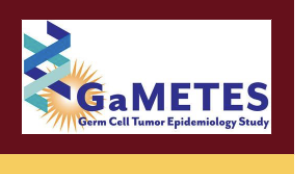
Germ Cell Tumor Epidemiology Study (GaMETES)

The GaMETES (Germ Cell Tumor Epidemiology Study) was designed to try to find out more about risk factors associated with germ cell tumors in children. The main purpose of this study is to understand how genes might affect young people's chances of developing a germ cell tumor (GCT). With the initial stages of this study complete patients and family members are being invited to expand their participation in a new part of GaMETES. A new study is beginning with patients to learn more about long-term effects and this site is here to provide resources and information for the process.
Who is eligible for this study? And how can I participate?
These are the people who are eligible for future studies:
- Patients: Participants from our previous GCT epidemiology study who consented for future contact from the study team (N=827 cases).
- Parents: Participated in our previous study.
- Siblings: Have a sibling who participated in our previous study, are willing to participate, and are able to complete a questionnaire in English or Spanish
DNA: Description, collection, storage, and future use
DNA—what is it? DNA is the genetic material in a person's cells that makes them unique. There are thousands of genes in each cheek cell which are made up of DNA. By studying DNA, scientists can discover what genes might cause young people to get germ cell tumors.
DNA—collection: The way we collect DNA from you is to have you spit into a sample collection cup that we will provide.
DNA—storage and future use: We will keep this DNA at our lab for a very long time in case there are things that we want to look at in the future that we haven't thought of yet. You can ask to have your DNA sample destroyed if you want to until 2019. After that we will not have your name and won’t be able to tell which DNA sample is yours. If you turn 18 before 2019 we will contact you to ask if we may continue to keep your DNA sample at our lab.
Why is this study being done?
Germ cells are reproductive cells that develop into sperm in males and eggs in females. Sometimes germ cells do not develop as they should and an abnormal growth can occur in the testicle or ovary, or in germ cells that have traveled to other areas of the body (such as the chest, abdomen, tailbone or brain). Germ cell tumors can be benign or malignant.
This is an epidemiologic study, which means that the researchers are gathering information from a lot of families in order to find patterns between potential risk factors they have been exposed to and germ cell tumors. It is known that some environmental factors, such as toxic chemicals, can cause disease. There are some genetic factors in people which can make it more likely for themselves or their children to develop tumors. Some tumors are caused by a combination of factors, including the environment and genetics.
In this study, both environmental and genetic risk factors are being looked at. Biological parents of young people diagnosed with germ cell tumors are asked to fill out a questionnaire and provide a sample of cheek cells. If one parent is not available to give a cheek cell sample, another son or daughter can instead.
The DNA from cheek cells may help us discover what genes might be involved in the development of germ cell tumors. Carefully determined questions will ask parents for information related to medical history, family health history, jobs, and their child's health. It must be emphasized that the significance of many of the questions we will ask is entirely unknown. Only by asking questions such as these can we learn whether any of these factors are important in the development of germ cell tumors.

Researcher in Charge
Principal Investigator
Jen Poynter, PhD, MPH
poynt006@umn.edu
Associate Professor
Division of Epidemiology & Clinical Research
Department of Pediatrics
University of Minnesota
Contact Us
Address:
420 Deleware St. SE
Minneapolis, MN 55455
Call
(612) 625-3910
(866) 434-9879





